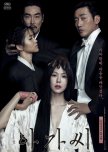I was itching to see Park Chan-wook's return to South Korean films after Thirst (2009) and his English-debut, Stoker (2013). Because of that, my expectations for The Handmaiden were definitely high.
Were they met?
Yes and no.
I don't know what I exactly expected to see. Maybe I was looking for something ala-Oldboy (2003), his best work to date and something better than Stoker (I didn't quite like it). But instead, I got something different. I just don't know if it's better or worst (than Oldboy but better than Stoker).
I find myself very enthralled with the production the most.
Park proves his mastery when it comes to making feels look beautiful and meaningful, and to me, his handling of build-up and then exploding them all at once is done so gracefully, so smoothly, so satisfying.
The Handmaiden is visually beautiful on all levels. Based (or inspired) by Sarah Waters' The Fingersmith, Park shifts the setting to 1930s colonial Korea. Just like Stoker, The Handmaiden is eerie, full of suspense and has a sexual, erotic tone—which clearly represents his film.
Broken into three parts, Park knows what cards to keep and when to reveal them—leaving room for a grand voila. The Handmaiden, itself, it not complicated nor does the plot try to be mysterious but its Park's touches that makes it sexually mysterious and ultimately full of taunting and teasing.
Colors emit a gothic vibe, the cinematography is superb, the score embraces the atmosphere and the characters are showered with undeniable tension from start to finish.
Ultimately, Park triumphs at showing female sexual satisfaction without the need of men. It's liberating as much as it's satisfying—an exploration, or explosion rather, of the female characters' undiscovered desires.
Esta resenha foi útil para você?


























